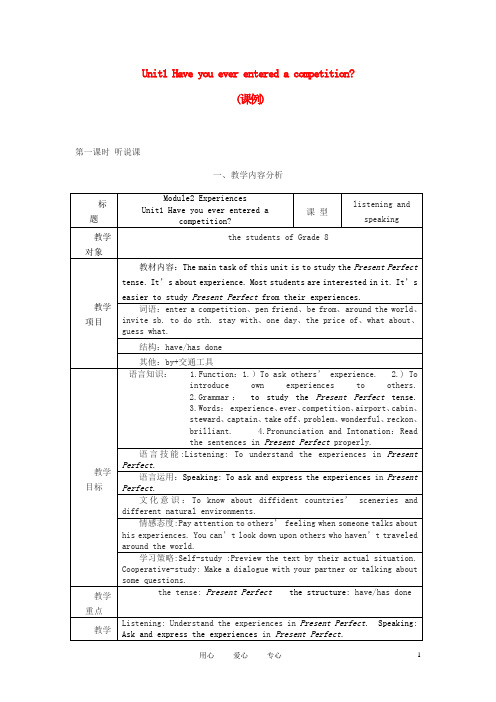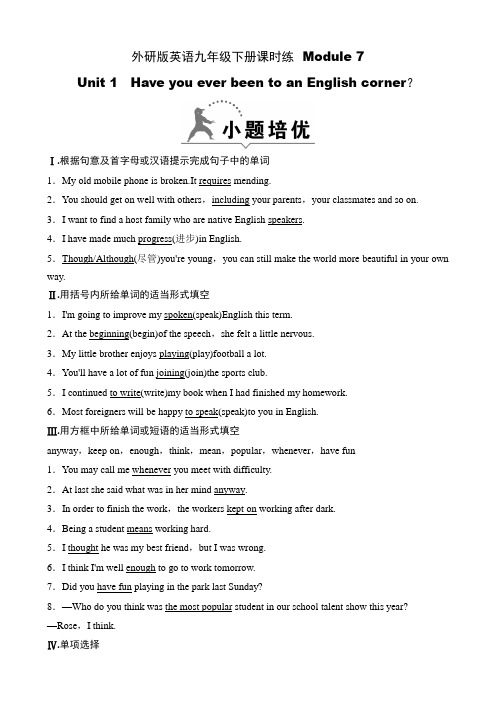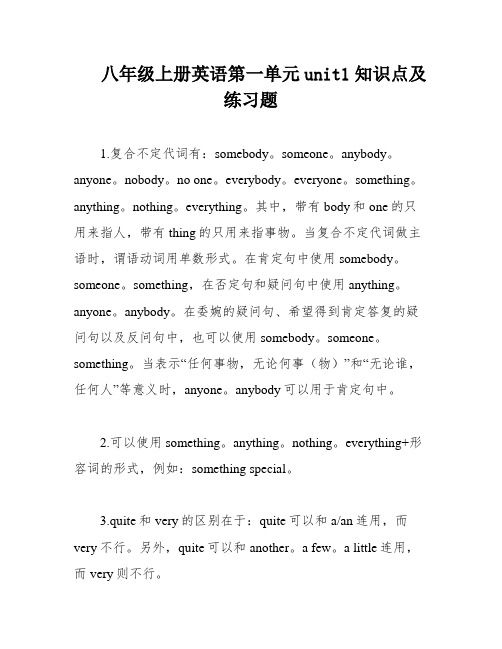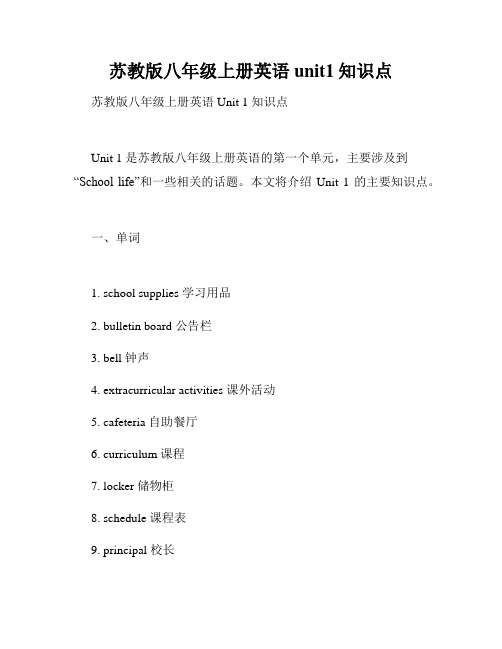Unit 1 Have you
八年级英语上册 Module 2 Unit 1教案 外研版

Unit1 Have you ever entered a competition?(课例)第一课时听说课一、教学内容分析二、课堂教学过程课后反思:通过平常上课,我发现大多数学生对英语学科充满了求知的愿望,但有些同学可能由于自己英语基础不是很扎实,表现的不是很积极。
所以为了开好本节课,我一方面通过设计简单的问题来提问;另一方面通过假设我要乘飞机,但我不知道如何去做,来让乘坐过飞机的学生来帮助我,没有坐过的我们一起来学习方式导入新课;这样可以激发学生学习英语的兴趣,同时可以拉近老师与学生的关系,以提高学生的积极性。
通过这样做,本节课的课堂气氛还是可以的。
在本课,新单词的呈现是通过与实物对照的方式完成的,以此来完成听力部分;由于课本的图片较单一和有些单词没有出现,所以我用幻灯片播放出一些听力内容涉及的单词、图片,这样更加适用与逼真,这样有利于教学教学任务的完成。
在进入对话部分时,先让学生先听对话,然后完成后面的习题,这样可以锻炼学生的听的能力;本环节总共听了3遍,第一遍统观全文,回答两个简单问题;第二遍则稍有难度,在第一遍的基础上完成表格,完不成则通过阅读来完成;第三遍则跟读录音,模仿录音当中的语音语调。
同时,学习课文中的知识点,并仿照例句自己造句子,学以致用。
本堂课的主要任务是学习现在完成时的基本结构:“have/has done”,比较单一,也比较简单,所以要从面上辐射到大部分学生,特别是困难生,要让他们起来积极做对话,在说的同时掌握其基本结构。
最后一个环节,让学生自己归纳总结现在完成时的结构,同时教师对此结构要下个概念:现在完成时,讲解时不要太深和复杂,否则完不成教学任务。
在本节课中大部分同都能积极参与课堂活动中来,课堂气氛活跃,能够完成教学任务;在讨论的过程中融入真实的交际,让学生们在不断地练习中获得成就感,让学生在快乐中学习,在学习中找快乐。
外研版英语九年级下册课时练 Module 7 Unit 1

外研版英语九年级下册课时练 Module 7Unit 1Have you ever been to an English corner?Ⅰ.根据句意及首字母或汉语提示完成句子中的单词1.My old mobile phone is broken.It requires mending.2.You should get on well with others,including your parents,your classmates and so on.3.I want to find a host family who are native English speakers.4.I have made much progress(进步)in English.5.Though/Although(尽管)you're young,you can still make the world more beautiful in your own way.Ⅱ.用括号内所给单词的适当形式填空1.I'm going to improve my spoken(speak)English this term.2.At the beginning(begin)of the speech,she felt a little nervous.3.My little brother enjoys playing(play)football a lot.4.You'll have a lot of fun joining(join)the sports club.5.I continued to write(write)my book when I had finished my homework.6.Most foreigners will be happy to speak(speak)to you in English.Ⅲ.用方框中所给单词或短语的适当形式填空anyway,keep on,enough,think,mean,popular,whenever,have fun1.You may call me whenever you meet with difficulty.2.At last she said what was in her mind anyway.3.In order to finish the work,the workers kept on working after dark.4.Being a student means working hard.5.I thought he was my best friend,but I was wrong.6.I think I'm well enough to go to work tomorrow.7.Did you have fun playing in the park last Sunday?8.—Who do you think was the most popular student in our school talent show this year? —Rose,I think.Ⅳ.单项选择1.Many cities in China,________ Beijing,have been deeply affected by dirty air. A.including B.behindC.without D.beyond2.Our life will be better and better.________,wish you grow up healthily and happily. A.Anyway B.HoweverC.Instead D.Exactly3.(2019·新疆乌鲁木齐第98中中考模拟)—What do you think of the lecture of the US president Donald Trump?—I think it's ________,but someone thinks it's much too ________.A.wonderful enough;boredB.wonderful enough;boringC.enough wonderful;boredD.enough wonderful;boring4.—Have you ever ________ an amusement park?—Yes,I have.I ________ Fun Times Amusement Park last year.A.been to;have gone toB.gone to;have been toC.go to;went toD.been to;went to5.Our country ________ great progress in science and culture in recent years.A.have made such B.has made suchC.made so D.has made soⅤ.根据汉语意思完成下列句子,每空一词1.随着我们年龄的增长,学习变得越来越难。
八年级上册英语第一单元unit1知识点及练习题

八年级上册英语第一单元unit1知识点及练习题1.复合不定代词有:somebody。
someone。
anybody。
anyone。
nobody。
no one。
everybody。
everyone。
something。
anything。
nothing。
everything。
其中,带有body和one的只用来指人,带有thing的只用来指事物。
当复合不定代词做主语时,谓语动词用单数形式。
在肯定句中使用somebody。
someone。
something,在否定句和疑问句中使用anything。
anyone。
anybody。
在委婉的疑问句、希望得到肯定答复的疑问句以及反问句中,也可以使用somebody。
someone。
something。
当表示“任何事物,无论何事(物)”和“无论谁,任何人”等意义时,anyone。
anybody可以用于肯定句中。
2.可以使用something。
anything。
nothing。
everything+形容词的形式,例如:something special。
3.quite和very的区别在于:quite可以和a/an连用,而very不行。
另外,quite可以和another。
a few。
a little连用,而very则不行。
4.few表示否定意义的可数名词复数,a few表示肯定意义的可数名词复数,little表示否定意义的不可数名词,XXX表示肯定意义的不可数名词。
5.what about和how about都可以表示询问“做…怎么样”,后面接动词ing形式。
6.seem和look的区别在于:seem暗示有一定根据的判断,look指由视觉而得出的印象。
7.XXX形容人感到无聊,XXX形容物使人感到无聊。
8.arrive at用于小地方,arrive in用于大地方。
9.decide to do sth和make up one's mind to do sth都表示“决定做某事”。
苏教版八年级上册英语unit1知识点

苏教版八年级上册英语unit1知识点苏教版八年级上册英语Unit 1 知识点Unit 1 是苏教版八年级上册英语的第一个单元,主要涉及到“School life”和一些相关的话题。
本文将介绍Unit 1 的主要知识点。
一、单词1. school supplies 学习用品2. bulletin board 公告栏3. bell 钟声4. extracurricular activities 课外活动5. cafeteria 自助餐厅6. curriculum 课程7. locker 储物柜8. schedule 课程表9. principal 校长10. student council 学生会二、短语1. go to school 上学2. have classes 上课3. study hard 努力学习4. take notes 记笔记5. join a club 参加俱乐部6. play sports 运动7. eat lunch 吃午饭8. make friends 交朋友9. do homework 做作业10. get good grades 取得好成绩三、语法1. 一般现在时一般现在时表示经常性或习惯性的行为,以及真理和事实。
例如:I go to school every day.(我每天上学)2. 物主代词物主代词用来表示所属关系。
例如:This is my book.(这是我的书)3. 不定冠词不定冠词指代未被确定的人或物。
例如:I have a pen.(我有一支笔)4. 介词 ofof 用来表示所属关系或从属关系。
例如:The name of the school is Lincoln Middle School.(这个学校的名字是林肯中学)四、对话本单元的对话主要围绕 School life 展开,包括上课、吃饭、课外活动等。
例如:A: Hi, Tom. What do you have first period?B: Hi, Li. I have English. What about you?A: I have math. Do you like English?B: Yes, it's my favorite subject. Do you like math?A: No, I don't like it at all. But I have to study hard for the test tomorrow.B: Good luck with that.五、阅读本单元的阅读材料包括一篇有关“校园活动”的文章,以及一个有关校规的表格,并要求学生根据表格内容写一篇短文。
仁爱版七年级上册Unit1 Unit2重要句型

Unit1 Making New FriendsTopic1 / Topic21. Hello. / Hi. 你好!-Hello. / Hi.2. Good morning !/Good afternoon! /Good evening!Good morning! /Good afternoon !/ Good evening!3. Welcome to China!欢迎来到中国!Thank you=Thanks谢谢!4. --Nice to meet you.认识你很高兴。
–Nice to meet you, too. 认识你也很高兴。
--Nice to see you.见到你很高兴。
--Nice to see you, too. 见到你也很高兴。
5. –How do you do?你好。
--How do you do?你好。
6.–How are you? 你好吗?--I’m fine/OK. thanks.我很好.谢谢-And you?你呢?-I’m fine,too.我也很好。
7. Good-bye再见. Bye8. See you later 待会见./再见See you9. – Excuse me, are you KangKang?打扰了,请问你是康康吗?–Yes, I am. / No, I’m not.是的,我是。
/不,我不是。
I’m = I am10.–Is she Jane?她是珍妮吗?--Yes, she is./No, she isn’t.是的,她是。
./不,她不是isn’t= is not11. --Is he Michael?他是麦克吗?--Yes, he is./No, he i sn’t. 是的,他是。
./不,他不是12. --Miss Wang, this is Michael . 王老师,这是麦克。
--Michael, this is Miss Wang. 麦克,这是王老师.13. –What’s your name?你叫什么名字?--My name is KangKang.我的名字是康康。
unit1知识点

unit1知识点
以下是Unit 1的知识点:
1. 问候和自我介绍:
- 问候的常用表达:Hello, hi, good morning/afternoon/evening, how are you?
- 自我介绍的常用句型:My name is xxx. I am xx years old. I come from xxx.
2. 介绍家庭成员:
- 家庭成员的称呼:father, mother, brother, sister, grandparents, etc.
- 介绍家庭成员的常用句型:This is my father/mother/brother/sister. His/Her name is xxx.
3. 询问和回答个人信息:
- 询问名字:What's your name?/What's your full name?
- 询问年龄:How old are you?
- 询问国籍:Where are you from?
- 回答个人信息的常用句型:My name is xxx. I am xx years old. I come from xxx.
4. 简单的日常用语:
- 感谢:Thank you. Thanks a lot.
- 道歉:I'm sorry. I apologize.
- 请问:Excuse me, can I ask you a question?
5. 时态:
- 一般现在时:表述经常发生的事情、事实和真理。
- 现在进行时:表示现在正在进行或发生的动作。
这些是Unit 1的主要知识点,希望对你有帮助!。
(外研社版(三年级起点))小学英语五下 Unit 1单元测试(含答案)

Unit 1 A phone call单元测试听力部分(40份)一、听录音,选出你所听到的内容。
听两遍。
(10分)()1. A. has B. have C. had()2. A. work B. wrong C. website()3. A. before B. popular C. programme()4. A. squirrel B. something C. storybook()5. A. find B. kite C. right()6. A. place B. great C. paint()7. A. egg B. bag C. get()8. A. grandson. B. granny C. grandma()9. A. phone call B. mobile phone C. phone box()10. A. wait a moment B. of course. C. see you tomorrow二、听录音,判断下列图片与所听内容是否相符,相符的写“T”,不符的写“F”。
听两遍。
(10分)()1.()2.()3.()4.()5.三、听录音,选择与对话内容相符的选项。
听两遍。
(10分)()1. ________ is phoning Jack.A. MaryB. MikeC. Ann()2. The girl will ________ this afternoon.A. go to the parkB. do her homeworkC. make a phone call()3. The boy wants ________.A. some teaB. some milk.C. some water()4. Linda can use a mobile phone to ________.A. play gamesB. listen to musicC. visit websites()5. Ann can find ________ birds in the tree.A. 13B. 30С. 33四、听录音,判断下列句子正误,正确的写“T”,错误的写“F”。
2024九年级英语下册Module7Unit1习题课件新版外研版

thought the fruit was dangerous. 【点拨】句意:一开始,许多欧洲人拒绝吃西红柿,因 为他们认为西红柿很危险。固定短语at the beginning 意 为 “起初; 刚开始”。
12. [2023 广安改编] The woman has won many competitions, __in_c_l_u_d_in__g_ (include) four gold medals in the Olympics.
【点拨】句意:这位女士赢得了许多比赛,包括四枚奥运会 金牌。including“包括”,介词,符合题意。故填including。
I can do ___D____ my dream.
A. to come true
B. come true
C. achieve
D. to achieve
【点拨】句意:我的梦想是有一天成为歌手,我将会做我能
做的去实现我的梦想。空处需要动词不定式作目的状语,排
除B、C。come true 前加主语dream;achieve 实现,及物动词,
【点拨】由“Sure.”可知,上句是请求得到对方的建议,
故D 项符合语境。
A: I see.
A. You know, I’m bad at it. B. The more you learn it, the
四、情景交际 根据对话内容,从方框内选 A. You know, I’m bad at it. B. The more you learn it, the
择恰当的句子将对话补充完整。 more you’ll like it.
外研版六年级上册英语Module6 Unit 1 You've got a letter 授课课件

3. MyauntChenCgdu. A. liveB. livesC. livesin
点拨:live后接地点Chengdu时,要加介词in。句中主 语是第三人称单数,动词live的第三人称单数形 式为lives。故选C项。
Use “and” or “but” tocompletethesentences.
1. I’vegotakite, Icanb’utftlyit. 2. Samhasgotadogheoftenplayswithit. 3. IliveinNewYork, IambnuottAmerican. 4. I’vegotapostcardit’sfrommypenfriend. 5. She’sgotanemailinFrench, shecabnu’ttreadit. 6. Iwanttogoswimming, I’vebguotacold.
他想踢足球。
知识点3 IliveinNewYork,butIamnotAmerican. 我住在纽约,但我不是美国人。
livein居住在 例句:IliveinBeijing. 我住在北京。
livein接大地点;若是小地点,变in为at; where问地点,in或at都去掉。
but的用法 but意为“但是”,连接单词或句子,表示语义的转折。 例句: Ihaveapiano,butIcan’tplayit.
陈 述 第三人称单数主语+hasgot+宾语. 句 其他人称主语+havegot+宾语.have /has got
疑 问
Has+第三人称单数主语+got+宾语?
九年级Unit 1 课本听力材料及翻译

Boy: Hey, everybody. There's a big test on Tuesday. I really need some help. Can you tell me how you study for a big test?Voices: Sure! Yes. Sure we will.Boy: You did really well on the last English test, didn't you, Meiping?Meiping: Yeah, I did OK.Boy: Well, how did you study for it? Meiping: By making word cards.Boy: Maybe I'll try that. So, how do you study for a test, Peter?Peter: By asking the teacher for help. She's always happy to answer my questions.Boy: That's interesting. How do you study, Tony?Tony: I like to study by listening to tapes. But sometimes my mother thinks I'm listening to music. And then she gets mad.Boy: Oh, maybe I won't do that then. Section A, 2a, 2bMan: Welcome to the English club. Today we're going to talk about the best ways to learn English. Does anyone learn English by watching videos?Girl 1: No. It's too hard to understand spoken English.Boy 1: What about keeping a diary in English? Do you learn English that way?Girl 1: Yes, I do. It helps to write English every day.Boy 2: Have you ever studied with a group? Girl 2: Yes, I have! I've learned a lot that way. Boy 2: Do you have conversations with friends in English?Girl 2: Oh, yes. It really improves my speaking skills.Girl 1: What about reading aloud to practice pronunciation?Boy 1: I do that sometimes. I think it helps. Girl 2: I do, too. And I often look up new words in a dictionary.Boy 2: That's a great idea! 男孩:嗨,同学们。
外研版-英语-六年级上册-6A Module3 Unit1 Have和Have got的区别

Have和Have got的区别1. Have got在英国英语中的意思是“有”肯定句中:第一、二人称单数I、you和所有人称的复数作主语时使用。
表示,我/你/我们/你们/它们、他们、她们有…….例如:I/You/We/They have got a car.否定句用法:haven’t got(即have not got)例如:I/You/We/They haven’t got a car.一般疑问句用法:have提前,回答用have或haven’t例如:Have you/they/we got a car? Yes,I /they/we have 或No, I/they/we haven’t.have got的第三人称单数形式为has got. 第三人称单数he、she、it和单数名词作主语时使用has got肯定句中:She/He/It has got a car.否定句:She/He/It hasn’t got a car.一般疑问句中has 提前,回答用,has或hasn’tHas he/she/it got a car.?Yes,he/she/it has. 或No,he/she/it hasn’t.2.Have 在美国英语中的意思是“有”。
在由have作谓语的句子变疑问句或否定句时,在美式面中,无论何种情况,都要借助于助动词do或does肯定句: 第一、二人称单数I、you和所有人称的复数作主语时使用。
表示,我/你/我们/你们/它们、他们、她们有……I/You/We/They have a car.否定句:用don’t haveI/You/We/They don’t have a car.一般疑问句中要用do提问:回答用do或don’tDo you/we/they have a car?Yes,I/we/they do?或No,I/we/they don't Have 的第三人称单数为has。
外研版小学英语(一年级起点)六年级上册Module3 Unit1 参考教案

Module3 Unit1 参考教案一、教学内容外语教学与研究出版社(一起点)六年级上册第三模块Unit 1 Have you got any stamps from China?二、教学过程建议(一)热身导入1. 请学生说SB Module 2 Unit 2活动4的韵句,鼓励学生边说边做动作。
2. 向学生展示SB Unit 1活动1的挂图,请学生说一说小狗手里拿着什么,小猫又在想什么。
3. 播放SB Unit 1活动1的动画或录音,请学生看动画或边听录音边看挂图,看一看自己刚才的猜测是否正确。
然后请学生回答问题:小猫为什么不吃小狗给的食物?4. 再次播放录音,请学生全班跟读、小组跟读、个人跟读,并请部分学生朗读对话。
(二)任务呈现1. 教师向学生介绍自己的爱好,并展示与爱好有关的物品。
例如,教师可以说: “My hobby is flying kites. Look, I have got a dragon kit e, a horse kite and a butterfly kite. Look at these photos. I’m flying my kite.”2. 教师对学生说:“同学们,你们也像老师一样,介绍一下自己的爱好,然后说一说你有哪些与爱好有关的物品吧。
我们来看一看哪些同学有相同的爱好,这样我们以后就可以一起从事这项活动了。
”(三)课文学习1. 播放SB Unit 1活动2的动画或录音,请学生看动画或边听录音边看挂图,理解课文语境。
教师可以根据课文内容提问,检测学生的理解程度。
2. 再次播放录音,请学生完整听一遍对话,进一步理解语句。
播放第三遍录音,请学生逐句跟读。
对于学生跟读有困难的语句,教师可以先带读较难词语,然后按照意群、节奏重点带读,请学生注意模仿语音语调。
3. 在跟读过程中,通过展示图片、做动作、说明等方式,学习“stamp, book, collect”的语义。
2016外研版六年级上英语课文全译文

Module 1 Unit 1 How long is the Great Wall?第一模块第一单元长城有多长?1. Listen and chant.1. 听录音并齐声唱。
This is the Great Wall. 这是长城。
It's very beautiful. 它非常美。
It's long and old. 它很长很古老。
And we love it all. 我们爱它的全部。
2. Listen, read and act out.2. 听录音,读一读,演一演。
Daming is visiting the US. 大明在游览美国。
He's in New York with his cousin Simon.他和他的表兄西蒙在纽约。
Tell me about the Great Wall, Daming. 大明,给我说说长城吧。
I want to go there.我想去那儿。
OK. When you visit me in China, 好的。
等你去中国看我时,we'll go there.我们就去那儿。
It's near my home.它离我家不远。
Can we walk along all of the Great Wall?我们能走完长城的全程吗?No, we can't walk along all of it.不,我们不能走完全程。
It's too long!它太长了!How long is the Great Wall?长城有多长?It's more than forty thousand li long.它有四万多里长。
Forty thousand li?四万里?Yes. That's more than twenty thousand kilometres!是的。
就是两万多公里!Wow! That's really long!哇!那真的很长!How old is it?它有多少年历史?It's more than two thousand years old?它超过2000年了。
高职高专实用英语Unit1 Text A

The Action Plan For a Summer Job
1.Have you had a part-time or
vacation job? If yes, what kind of job was it?
worker, seller, waiter, tutor,
attendant……
第四步是利用一切资源来获得理想中的工作。跟你
的父母、长辈、朋友的父母、老师,或你认识的其 他成年人谈谈,看看他们是否跟你想去的公司有联 系。把你的简历给他们。我们称此为建立关系网。 这会为你得到理想工作带来更多机会。
6.The fifth step is to hit the road, read the newspaper want ads, or surf the web. If you don't get any job leads from the fourth step, you have to take action!
不定式充当 句子的表语
为定语从句,修 饰job,省略that
如:The duties of a postman
is to deliver letters and newspapers. 邮递员的任务就是投递信和报纸。
You may not be able to find a job that meets all your
鲁教版初三英语unit1sectionb

Carefully reading and answering
Why did she want the job?
How long has Mei Shan been a flight attendan
She has been a flight attendant for two yea
Because she wanted to travel
Carefully reading and answering
How long has Mei Shan been a flight attendan Why did she want the job? How long did she study English?
Has David ever been to an English -speaking country? How long has he studying at Hilltop Language School? What other job is he thinking of doing?
I want to be a tour guide(做导游). In fact ,it’s all I have wanted to be.I want to travel, especially to English-speaking countries(尤其是去讲英语的国家) such as (例如)the United States and Australia. However, I know that I have to improve(必须提高) my English, so I’ve started taking lessons (开始上 课)at the Hilltop Language School. The Hilltop Language School has really helped me learn English. I’ve been (成为)a student here for a year now, and I really love it.Maybe when I leave school I’ll think about becoming (考虑成为)an English teacher rather than (胜过)a tour guide!
七年级上册英语unit1、2的重点短语

七年级上册英语unit1、2的重点短语一、Unit 11. say hello to sb. 向某人打招呼例句:Say hello to your parents for me when you get home.2. in the morning 在早上例句:I usually go jogging in the morning.3. go to school 去上学例句:What time do you usually go to school in the morning?4. have breakfast 吃早餐例句:I never have breakfast in the morning because I’m not hungry.5. get up 起床例句:What time do you get up on weekends?6. five minutes ago 五分钟前例句:She left the house five minutes ago.7. on time 准时例句:You need to be at the 本人rport on time or you will miss your flight.8. take the bus 乘公交车例句:I usually take the bus to work instead of driving.9. at this time 在此时例句:I can’t talk right now. I’m busy at this time.10. for the first time 第一次例句:She rode a horse for the first time and loved it.二、Unit 21. have a good time 玩得开心例句:I hope you have a good time at the party tonight.2. be interested in 对…感兴趣例句:She is really interested in learning to play the guitar.3. look for 寻找例句:I spent all afternoon looking for my keys.4. take photos 拍照例句:We took lots of photos at the beach.5. on vacation 度假例句:They are on vacation in Haw本人i for two weeks.6. visit the Great Wall 参观长城例句:I want to visit the Great Wall of China someday.7. in front of 在…前面例句:I w本人ted in front of the store for my friend.8. at the moment 此刻例句:She is not av本人lable at the moment. Can I take a message?9. ride a horse 骑马例句:She likes to ride a horse in her free time.10. at the same time 同时例句:I can’t talk and cook at the same time, it’s too difficult.以上是七年级上册英语unit1、2的重点短语,掌握这些短语对于学生来说是非常重要的,希望大家能够认真学习,提高自己的英语水平。
九年级unit1知识点

U n i t 1 SectionA1a-2cby的用法:介词,表示通过…方法或途径的意思,译成“靠,通过”,后面可加名词,动名词(v-ing)或名词短语。
1)Thehousewasdestroyedbyfire.房屋被火烧毁了。
2)travelbyair/land/sea.航空(陆路,航海)旅行3)gobytrain/boat/bus乘火车(船,公共汽车)去4)shakesb.bythehand和某人握手5)IstudyEnglishbywatchingEnglishmovies.我通过看英文电影学英语。
另外,by作为介词的意义有很多,例如:1)在…旁边,靠近Thereisapowerstationbytheriver.河边有一个电厂。
2)沿着,经由comebythehighway由公路来3)由于bymistake由于差错4)被,由somearticleswrittenbyLuXun一些由鲁迅写的文章5)表示面积aroom5mby4m一间长五米宽四米的房间6)逐个onebyone一个接一个look相关短语lookabout(round;around);lookahead;lookback;lookup;lookdown;l ookleft;lookright;looksb.upanddownlooksth.up(在字典、参考书或电脑中)查找looksb.up(顺便)拜访,探望lookuptosb.尊敬某人lookdownonsb.轻视某人;瞧不起某人ask相关短语:asksb.forsth.向某人要某物asksb.aboutsth.向某人询问有关某事的情况asksb.todosth.要求或请某人去做某事asksb.nottodosth.要求或请某人不要去做某事Whatabout…?句型whatabout+v.-ing/n./pron.(征求意见)怎么样,如何eg.Whataboutthisbike?这辆自行车怎么样?Whataboutherpainting?她的画儿怎么样?Whataboutreadingaloudtopracticepronunciation?大声地读练习发音怎么样呢?辨析aloud/loud/loudlyaloudadv.大声地;出声地,与call,cry,read等连用loudadj.响亮的;大声的,作表语或定语adv.大声;高声,放在speak,shout,laugh,talk后loudlyadv.大声地;响亮地,含有“喧闹”的意味eg.Don’ttalksoloudly.别那么高声说话。
- 1、下载文档前请自行甄别文档内容的完整性,平台不提供额外的编辑、内容补充、找答案等附加服务。
- 2、"仅部分预览"的文档,不可在线预览部分如存在完整性等问题,可反馈申请退款(可完整预览的文档不适用该条件!)。
- 3、如文档侵犯您的权益,请联系客服反馈,我们会尽快为您处理(人工客服工作时间:9:00-18:30)。
Unit 1 Unit 14 Have you packed yet?
第5课时Reading
一、学习目标:
1.New words: ancestor root overseas homeland government southern villager strongly purpose step
2.Phrase: so far thanks to look forward to
3.Grammar: 现在完成时态的构成和用法
二、自主学习(教师寄语:Many hands make light work. )
1.阅读文章理解大意。
2.找出下列短语:(1)回到(2)海外华人(3)夏令营
(4)到目前为止(5)数以千计的(6)中国文化
(7)山村生活(8)日常活动(9)幸亏(10)期盼
三、合作探究
1.小组内分段理解文章梳理知识点
2.完成3a相关练习
3.Where did he go to visit?
4.What do they do in their ancestors’ village?
5.What’s the purpose of the In search of Roots summer camp program?
四、巩固达标(教师寄语:Never do things by halves)
1. So far we ______ lots of English words.
A. will learn
B. have learned
C. are learning
D. has learned
2.I’m looking forward to ______ him again.
A. see
B. saw
C. seeing
D. seen
3. Not only he but also his father _______ to many places of interest since they came here.
A. have been
B. has been
C. have gone
D. has gone
4. Please go to the station to _______ when the train to Beijing starts to leave.
A. find for
B. look for
C. find out
D. find
5.The children enjoyed very much last night.
A. they B.them C.themselves D.theirs
6. —Who _____ the dictionary? I want to use it.
—Zhang Ming. He _____ it for a week.
A. borrowed; borrowed
B. borrowed; has kept
C. borrows; borrowed
7.My dictionary ___. I have looked for it everywhere but still ___ it.
A. has lost; don’t find
B. is missing; don’t find
C. has lost; haven’t found
D. is missing; haven’t found
8.In the last three years, we ______ more than 1000 English words.
A.were learning B.have learnt C.are learning D.will learn 9.—______ have you been to the beach? —Only once.
A.How long B.How often C.How many times D.How soon
10. -Could you help me put up the signs on the wall? -_______.
A. No problem
B. I hope so
C. That’s all right
D. That’s a good idea
11.I think the car was invented _______ 1885.
A. on
B. of
C. at
D. In
12.There are 8____ student in our school.
A. Hundred
B.hundred of
C.hundreds of
D. Hundreds
13.I saw him _______ in the supermarket at that time.
A.shop
B.to shop
C.shopping
D.shoping
14.There are ______ interesting books that I don’t know which to read first.
A.so many
B.so much
C.such many
D.such much
15. We need friends to ________, or we will feel ________.
A. chat, alone
B. chat with, lonely
C. speak, lonely
D. talk with, alone
16. He _______ carefully but he could not ________ his teacher clearly.
A. heard, listen
B. listen, hear
C. listened, hear
D. heard, listened
17. Mike is _______ honest man. I __________ him.
A. an, believe on
B. a , believe in
C. an, believe in
D. the, believe
18.The________ were very friendly to us.(village)
19.Amy is sure of his success________. (strong)
20.Mary, It’s your turn_______ the dishes.(wash)
.五、本节课学会了什么?(课后反思)。
